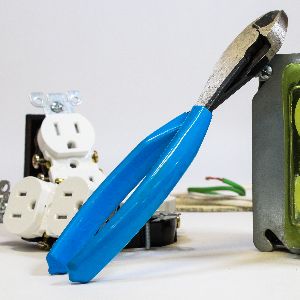DIY Electrical Work: What You Can (and Shouldn’t) Do Yourself
Thinking about tackling some electrical work around the house? While some basic DIY projects are safe and doable, others are better left to a professional. When it comes to your home’s wiring, knowing the difference can save you time, money—and most importantly—keep you safe. At SmartGuard, we’re all about giving homeowners nationwide the confidence to take on small upgrades the smart way.
Risks Of DIY Electrical Work
Electricity is an immensely powerful force, and with that power comes risk. Attempting to tackle electrical work without the proper knowledge or training can lead to catastrophic results, including electrical fires, electrical shock, or even fatalities. Homeowners need to consider their skills and comfort with DIY projects before starting any electrical work.
- Fires: Often starting behind walls, these can quickly become life-threatening and result in significant property damage.
- Shock: May lead to severe injuries or death if not handled correctly.
- Code Violations: DIY work might not meet local building codes, leading to potential legal issues and increased future repair costs.
- Insurance Issues: Improper electrical work can void home insurance policy claims.
Projects You Can Probably Safely Do Yourself
While the dangers of electrical work are real, not every task is off-limits for the savvy homeowner. There are several smaller, lower-risk projects that you may safely handle yourself. Always turn off the power via your breaker box before attempting any of these tasks.
- Replacing Light Switches & Outlets: Basic tasks that do not require complex knowledge beyond ensuring the power is off.
- Installing Or Replacing Light Fixtures: Follow manufacturer instructions and ensure proper connections.
- Upgrading Outlet Plates: A simple aesthetic enhancement involving the replacement of the outlet cover without altering wiring.
- Installing Smoke Detectors: Battery-operated models are straightforward, while hardwired installations should be handled with caution.
- Adding Or Replacing a Mud Ring (Electrical): This thin metal or plastic ring mounts to a junction box to hold switches or outlets in place. It’s a common step when patching drywall or upgrading outlets and is typically safe for DIYers with basic skills.
When To Call A Licensed Electrician
For more complex or high-risk electrical projects, hiring a licensed electrician is not just a safe choice—it’s a necessary one. Professional electricians are trained to handle complicated and dangerous tasks while adhering to local codes and regulations. Always hire a professional if you’re unsure about the electrical process, and especially with projects such as:
- Rewiring A Home: Involves working with a live electrical system and ensuring everything meets building codes.
- Panel Upgrades: Require an understanding of heavy electrical loads and precise wiring techniques.
- Installing New Circuits: Integrating additional power sources into your home requires a deep understanding of electrical systems.
- Fixing Electrical Surges: Requires diagnosing and addressing issues that could indicate larger problems with your home’s electrical system.
FAQs About DIY Electrical Work
Homeowners often have many questions regarding DIY electrical tasks. Here are a few common queries and their answers:
Can I Wire A New Addition Myself?
While it may be tempting to handle this, it’s best left to professionals due to the complexities involved.
Is It Safe To Reset A Tripped Breaker?
Yes, as long as you identify and rectify the cause of the trip beforehand.
What's The Harm In Leaving It For Later?
Delaying fixes on faulty wiring can lead to more severe hazards over time.
Understanding Electrical Codes & Safety Standards
Adhering to local and national electrical codes is imperative for any electrical work. The National Electrical Code (NEC) sets a baseline for safety standards, but local codes can vary and often focus on specific geographical needs. DIY enthusiasts must ensure their projects adhere to these codes to avoid future complications.
- Ensures Consistent Safety: Codes provide safety guidelines that prevent fires and other hazards.
- Real Estate Value: Meeting electrical codes maintains and potentially increases home value.
- Legal Requirement: Non-compliance can result in fines or denied permits for future work.
Essential Tools For DIY Electrical Tasks
Having the right tools at your disposal can make all the difference. Being well-equipped not only makes tasks more manageable but also ensures safety. The right equipment not only makes each task easier to complete, but it also plays a vital role in keeping you safe. Whether you’re replacing a light fixture or upgrading outlet plates, here are a few go-to tools every DIYer should keep on hand:
- Voltage Tester: Crucial for checking if an electrical current is present.
- Wire Strippers: Necessary for safely stripping insulation from wires.
- Multimeter: A versatile tool for measuring voltage, current, and resistance.
- Non-Contact Voltage Sniffer: Detects electrical current without the need for direct contact.
SmartGuard’s Commitment To Safe Home Improvement
At SmartGuard, we’re here to make electrical projects safer—whether you’re a DIYer tackling a weekend upgrade or a licensed pro on the job. Our line of durable covers and guards is designed to protect what matters most: your home, your crew, and your peace of mind. With the right gear and the right guidance, you can take on your next project with confidence. When in doubt, always work with a licensed electrician—and when it comes to protection, trust SmartGuard.

